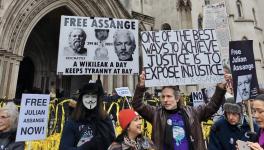Judge Turns Down Plea to Extradite Julian Assange to US; Bail Hearing on Wednesday
A judge in the United Kingdom has rejected the US appeal for the extradition of WikiLeaks founder Julian Assange. Judge Vanessa Baraitser announced her decision on Monday, January 4, citing the high risk of Assange committing suicide due to the brutal prison conditions in the United States.
Assange’s bail application will be heard on Wednesday. The prosecution has indicated it will appeal the verdict.
Assange is currently being indicted in the US under the infamous Espionage Act and the Computer Fraud and Abuse Act. He faces a total 18 charges of federal crimes, including espionage and cybercrimes, which together carry a maximum sentence of 175 years. A superseding indictment was filed in 2020. The case was seen as a vital one for press freedom across the world. However, the judge largely agreed with the prosecution’s arguments and rejected the extradition appeal only due to the risk of suicide.
We're moments away from British judge announcing extradition decision in WikiLeaks founder Julian Assange's case. I'll have live updates shortly.
— Kevin Gosztola (@kgosztola) January 4, 2021
The extradition treaty between the United States and the United Kingdom, prevents an extradition process if it puts the defendant in great deal of physical harm, including suicides. Baraitser accepted Assange’s defense team’s argument that he faced “the bleak prospect of severely restrictive detention conditions designed to remove physical contact and reduce social interaction and contact with the outside world to a bare minimum.”
“He faces these prospects as someone with a diagnosis of clinical depression and persistent thoughts of suicide,” the judgement added.
The judge said that in the harsh conditions in the US prison, “Mr. Assange’s mental health would deteriorate causing him to commit suicide with the “single minded determination” of his autism spectrum disorder… I find that the mental condition of Mr. Assange is such that it would be oppressive to extradite him to the United States of America.”
During the period of the extradition prosecutions, Assange was held under judicial remand in a high security prison in Belmarsh, near London. Several experts, including medical practitioners and a UN special rapporteur, have stated that his physical and mental health has deteriorated inside the prison, opposed his extradition and called for his immediate release.
While celebrations broke out across the world, there were voices of caution too due to the judge accepting most of the prosecution’s arguments. Veteran investigative journalist, Glenn Greenwald, argued that the “the judge endorsed most of the (US government’s) theories, but ultimately found the US prison system too inhumane to permit extradition.”
The rejection by the UK court of the US Govt's request to extradite Julian Assange to stand trial on espionage charges is obviously great news. But the judge endorsed most of the USG's theories, but ultimately found the US prison system too inhumane to permit extradition.
— Glenn Greenwald (@ggreenwald) January 4, 2021
Anti-war activist and documentary maker, John Pilger, while celebrating the outcome, has called the judgement a “face-saving cover” for the UK and a justification for the “disgraceful” trial against Assange at the behest of the US.
Julian #Assange has been discharged by the judge at the Old Bailey on grounds that he was too great a suicide risk if extradited to the US. This is wonderful! It's a face-saving cover for the British to justify their disgraceful political trial of #Assange on America's behalf.
— John Pilger (@johnpilger) January 4, 2021
Get the latest reports & analysis with people's perspective on Protests, movements & deep analytical videos, discussions of the current affairs in your Telegram app. Subscribe to NewsClick's Telegram channel & get Real-Time updates on stories, as they get published on our website.























